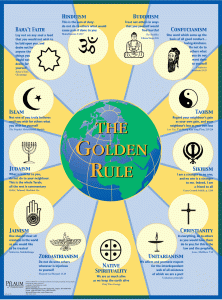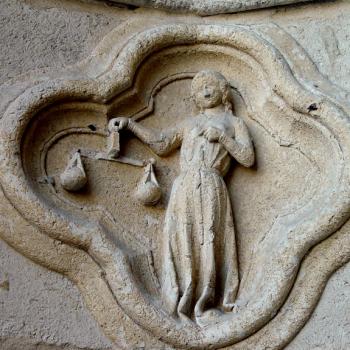
Pavel Florensky, while in a gulag, was able to write to his family, telling them about his day-to-day life, but also to give them advice, encouraging them to live in the world the best they could. While he was a priest and a theologian, he was also a scientist, and it is as a scientist his skills were sometimes put to use, as his scientific qualifications were recognized by his fellow scientists, and this, it can be said, was one of the reasons why he, a priest, was allowed to live for years before being finally executed. Sometimes, those running the gulags were not as accommodating as others, but he always tried to make the best of his situation and he wished his family would do so as well. Thus, despite his experiences, and the kinds of abuse he faced on a daily basis, he wanted to live out his life the best he could, and his faith certainly helped make that possible. He hoped that his family would do the same. The Golden Rule was very important to him, and he thought if it were acted upon by society, it would bring about positive social change:
Act so that your behavior can be an example for everyone. If you consider what would happen if everyone did like you, then you would realize that society would start to fall apart and that life in general would become unbearable for everyone, including you. So try to behave so that your behavior, if repeated by everyone, would make life, if not perfect, at least bearable. [1]
While the Golden Rule was not an exclusive teaching of Christ, it was one which Jesus emphasized, both in word and in deed. We should not imitate those who wish us harm, but rather, we should treat others the way we wish to be treated by them. If we want others to consider our welfare, we should be concerned about theirs. A society which acts in this way will promote the common good, as, it should be obvious, the rule would have us be concerned about the good of all. Yes, it is not always easy to put into action what the Golden Rule expects from us. We are human, with human emotions; when someone hurts us, when we are treated unjustly, we want to push back, and sometimes, to be sure, some unjust situations require us to do so (but the response must be proportional to the situation). When justice demands from us what appears to be an exception to the Golden Rule, such as having someone make reparations for the harm they have caused others, it is justified because it ends up promoting the common good, which the rule intends to establish. When, on the other hand, we find it difficult to act according to the expectations of the Golden Rule, when our passions get the best of us, we must admit what we have done is not for the best and try to do better, striving for the best out of ourselves so that we do not end up giving anyone an excuse to ignore the Golden Rule. We should expect that, as we do not live in some utopian, we will make mistakes, and society will not be perfect. This should not be used as an excuse to ignore our responsibility, but rather, it means we should never give up trying to make things better so long as we should live. And, if we find ourselves in a society where the common good is rejected, where selfishness instead of the Golden Rule is the norm, we must not let such an unjust society determine how we should act.
If we want to transform society, if we want to make it better, we must in be involved in the change, not only by speaking out against injustices, but by becoming the examples society needs to see such a change is possible. If we don’t, we will find ourselves slowly giving in and accepting the unacceptable, forming habits which go along with the injustices which are around us, habits which will then make it that much more difficult for us to do what is right in the future. Nonetheless, no matter how far we have fallen, we must not despair, for we are not in this all alone. We have God working for us, offering us the mercy and grace we need to pick ourselves back up, to fight against and overcome the bad habits we have formed, and do the good which we know we should be doing:
In spite of all these things, God remains well disposed toward everyone. To no one does he deny his mercy. Why, he even bestows many good things indiscriminately upon all. He prefers to invite with acts of kindness those whom he could rightly subdue with punishments. Delay in retribution makes room for repentance. It cannot be said, however, that there is no vengeance where conversion does not take place. For, a hard and ungrateful mind becomes already its own punishment. It suffers in its conscience whatever has been deferred by the goodness of God. [2]
In the incarnate God-man, we have the perfect representation of the Golden Rule, as Jesus puts it perfectly in action. When we find him telling us to act in and with love, to treat others as we would like to be treated, it is what he himself did, as can be seen in the way he treated sinners, as well as those who were treated as outcasts in society, with the love. He acts the same way with us. Jesus loves us, forgives us, shows us mercy, gives us grace, and in doing so, confirms our human dignity; he wants us to do likewise by loving him as he can be found in all humanity, especially in the poor and the dispossessed. We should take on what God has shown us, realizing, just as God’s love for us helps make us better, the more we love others, the more we can make them, and society better. While we might not see the fulfillment of what we do in our temporal existence, we will see it in the eschaton, where our contributions in building up those around us will bear fruit which will be honored for all eternity.
[1] Pavel Florensky, Letters from the Gulag. Trans. Adela Lawless (No City: Independently Published, 2020), 304 [To Mik, Jan. 3-4, 1937].
[2] St Leo the Great, Sermons. Trans. Jane Patricia Freeland CSJB and Agnes Josephine Conway SSJ (Washington, DC: CUA Press, 1996), 153-4 [Sermon 35].
Stay in touch! Like A Little Bit of Nothing on Facebook.
If you liked what you read, please consider sharing it with your friends and family!
N.B.: While I read comments to moderate them, I rarely respond to them. If I don’t respond to your comment directly, don’t assume I am unthankful for it. I appreciate it. But I want readers to feel free to ask questions, and hopefully, dialogue with each other. I have shared what I wanted to say, though some responses will get a brief reply by me, or, if I find it interesting and something I can engage fully, as the foundation for another post. I have had many posts inspired or improved upon thanks to my readers.












